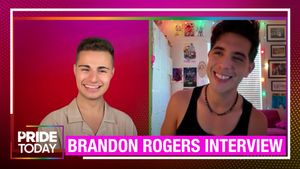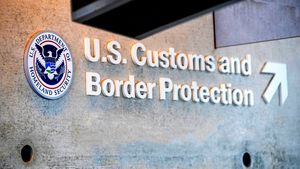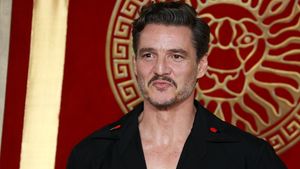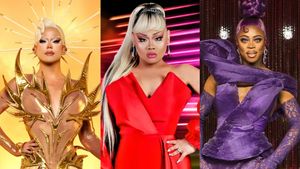In the wake of the massacre at Orlando's Pulse nightclub, some pundits, activists, and presidential candidates have trotted out the reliable red herring that the deadly rampage could have been thwarted if there had only been some "good guys with guns" inside the LGBT club.
The New York Times featured one such piece in a June 22 op-ed by Nicki Stallard. Stallard -- a transgender woman and spokesperson for the Pink Pistols, an LGBT gun club -- has previously recommended that LGBT people buy firearms as a means of self-defense, and she claims there's been a recent uptick in interest in the organization.
In her op-ed, Stallard also speculated how many people could have been saved in Florida if they had only brought their guns to the club. But the Pink Pistols' call to arms is misguided, misinformed, and utterly irresponsible. There is a vast body of evidence that disproves these pro-gun talking points and suggests that gun ownership would have disproportionately negative outcomes for LGBT people. Here's why Stallard's op-ed isn't just wrong, it's irresponsible.
First, it's been well-documented that gun ownership does not make people safer. In cases of assault, victims were more than four times more likely to be shot or murdered if they were in possession of a gun. According to The Journal of Preventive Medicine, 4.1 percent of crime victims were injured after brandishing a firearm, compared to 2.4 percent of victims who ran away or hid. Additionally, permissive concealed carry laws are associated with increases in aggravated assault, not the thwarting of attacks. And in a review of 62 mass shootings over 30 years, Mother Jones found no evidence that armed citizens serve as an effective means to stop attacks. In fact, the publication found two separate incidents where a would-be hero with a licensed firearm was killed or wounded trying to stop an attack. In another incident, an armed vigilante admitted to almost shooting a bystander who helped tackle a shooter.
In cases where LGBT people have been able to fight off an attacker, they are often denied the benefit of self-defense laws. In 2011, CeCe McDonald, a black transgender woman, was assaulted by a bar patron who sliced her face open with a glass. Several people became involved in a scuffle, and McDonald fatally stabbed an attacker with pair of scissors in self-defense. She accepted a plea deal and was sentenced to 41 months in prison, and served 19 months incarcerated with men. The same year McDonald was attacked, Ky Peterson, a black transgender man from Georgia, was sentenced to 20 years for killing a man who was raping him, despite the state's permissive self-defense laws.
In 2007, Dwayne Buckle attacked seven lesbians, punching and choking them and threatening to rape them "straight." All seven women received jail sentences after successfully fighting him off with a kitchen knife. Eisha Love was released after being incarcerated for four years without a trial, charged with striking her attacker with her car as she fled from an anti-trans attack. Once incarcerated, LGBT people often face disparately harsh sentences and experience higher rates of violence and sexual abuse, according to a 2015 report by the advocacy organization Black & Pink.
Even having guns in the home is particularly dangerous for LGBT people. Transgender people and bisexual women are especially at risk of being the victims of interpersonal violence. In the last year and a half, more than 30 transgender women have been murdered, many by their current or former partners. Women killed by their intimate partner are more likely to be murdered with a firearm than by all other means combined. Additionally, women who live with their partners in homes where there is a gun were at an increased risk of intimate partner homicide.
Suicide rates and suicidal ideation for LGB people are already significantly higher than for the general population, and almost half (41 percent) of transgender people have reported attempting suicide. According to research, the likelihood of suicide increases when there's a gun in the home -- and for an already vulnerable community, this is too great a risk.
The Pink Pistols, along with gun store owners, have been selling snake oil to media outlets, citing unsubstantiated anecdotal claims of higher firearms sales to LGBT people, and pointing to an increase in members on the Pink Pistols Facebook page. Even a perfunctory glance reveals that many of these new members are actually straight men who are gun enthusiasts and have wandered over from the National Rifle Association to make pro-gun arguments -- with some even openly expressing their distaste for the LGBT "lifestyle."
Of course, that's no surprise from the pro-gun crowd, as NRA officials have spent the last 20 years engaging in virulent anti-LGBT rhetoric, calling us "twisted" and "perverted," and praising Zimbabwe's dictator Robert Mugabe for saying that people like me and those who were killed in Orlando "don't deserve civil rights." In response to the tragedy in Florida that explicitly targeted LGBT Latinos, the NRA released a statement that did not mention the LGBT community even once.
In reality, the LGBT community has strengthened its resolve to advocate for better gun violence prevention laws. A coalition of 50 heavy-hitting, mostly LGBT advocacy organizations has sent a letter to Congress demanding that legislators take immediate action to address gun violence.
Make no mistake: The newest iteration of the pro-gun agenda has nothing to do with protecting LGBT lives and everything to do with blindly and irresponsibly selling guns to an untapped market. Telling LGBT people to carry guns so they don't get "bashed" -- as the Pink Pistols group has done recently -- is like telling a woman to stop wearing short skirts to avoid rape. It's out of touch and deflects blame from those who should truly be held accountable.
If members of the Pink Pistols are really concerned about ending deadly violence in the LGBT community, they could start by cutting their ties with the gay bashers at the NRA.
 ERIN FITZGERALD is the LGBT Program director at Media Matters. She previously worked at the Williams Institute at the University of California, Los Angeles, School of Law and the National LGBTQ Task Force. Follow her on Twitter @QueerEconomicus.
ERIN FITZGERALD is the LGBT Program director at Media Matters. She previously worked at the Williams Institute at the University of California, Los Angeles, School of Law and the National LGBTQ Task Force. Follow her on Twitter @QueerEconomicus.































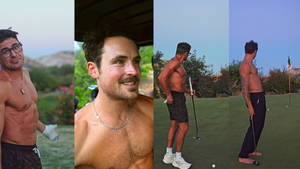
 ERIN FITZGERALD is the LGBT Program director at
ERIN FITZGERALD is the LGBT Program director at 



